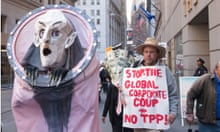Trans Pacific Partnership meetings are set to wrap with a meeting of trade ministers in Singapore this weekend. The stakes are high for Australia as the secretive negotiations draw to an end, with our Pharmaceutical Benefits Scheme set to be a hotly contested political issue in the final hours of the talks.
The outcome of the debate will have ramifications for all of us.
A recently leaked document showed the US sees the TPP as a means of extending patent monopolies for its drug companies. Put bluntly, this would increase the cost of medicines for all us, hitting with particular force those who are sick and those who can least afford to be coughing up more cash to pay for vital medications.
But the TPP also presents a direct threat to the way the PBS operates and its ability to contain costs and ensure value for money. America’s pharmaceutical industry association, PhRMA, has flagged that modifying programs for subsidising medicines, including Australia’s PBS, is one of its key objectives. The big transnational drug companies want changes to the rules and processes for listing and pricing drugs.
In 2011, a US proposal for an annex to the transparency chapter of the TPP was leaked. This annex specifically targeted programs for subsidising medicines and medical devices. Reports at the time indicated that this proposal, often referred to as the “healthcare transparency annex”, was rejected in its entirety by the other TPP countries.
No further text from this part of the agreement has been leaked since, although reports suggest that a revised (but probably not very different) version was tabled by the US in September 2012 in a second unsuccessful attempt to persuade the other TPP parties to change their processes for pricing and subsidising drugs.
The healthcare transparency annex presents an insidious threat to the effective operation of the PBS. While it is framed in terms of increasing transparency and “procedural fairness”, the real objectives of the US are to limit the ability of countries to regulate prices, and to increase the opportunities for pharmaceutical industry involvement in decision making.
The annex will rule out an important pricing mechanism used in the PBS to keep prices low and ensure value for money, known as “therapeutic reference pricing”. This mechanism means that the prices of new drugs are linked with the prices of existing drugs that are already available for the same condition. But under the draft annex, the value of a drug would instead be determined by whether or not it is under patent.
The 2011 draft of the annex also included an appeals mechanism that would give the pharmaceutical industry more rights than the limited review process we currently have in Australia. Unlike the current independent reviews, the appeals mechanism sought by the US would enable drug companies to challenge, and potentially overturn, any aspect of decision making about whether to list a drug on the PBS and how much to pay for it.
The 2011 draft annex included many other provisions that would force the PBS to disclose more information about its determinations and decision criteria, disclose the membership of committees and provide more opportunities for pharmaceutical industry input at various points in the process.
Despite the rhetoric of transparency and fairness, requirements like these only benefit industry stakeholders, and make it more difficult for health systems to contain pharmaceutical costs. Rising pharmaceutical expenditure brings with it opportunity costs – more money spent on drugs means less to spend on other health services and preventive health care – and the need for increased patient co-payments. In other words, it is people who bear the costs, in one way or another, when the pharmaceutical industry is provided with extra privileges.
The pharmaceutical industry claims that concerns about the PBS are exaggerated since similar concerns at the time of the Australia-US Free Trade Agreement were, on the whole, not borne out in the final text of that agreement. But comparison of the TPP text with the pharmaceuticals annex in the bilateral agreement shows that the provisions proposed for the TPP are far more intrusive and pose a much greater threat to the PBS than those in the AUSFTA.
It is highly concerning to public health advocates that the future of the PBS remains undecided at this late stage in the negotiations. The minister for trade and investment, Andrew Robb, recently made a statement that “The Pharmaceutical Benefits Scheme is an integral part of Australia's health system and the Government will not permit any outcome in its trade negotiations which undermines the PBS or Australia's health system more generally.”
But trade negotiations involve compromises and trade-offs, and increasing access to overseas markets for our agricultural and other exports is a high priority to the current government. And it seems extremely unlikely, given the influence of the powerful pharmaceutical industry lobby, that the US will give up its ambitions for our PBS.
The final meeting for the TPP in Singapore this weekend could find Andrew Robb with a list of market access priorities in one hand and a list of politically sensitive, potential trade-offs in the other. The PBS could well be on that list. What plays out could prove to be a bitter pill to swallow for Australia.





